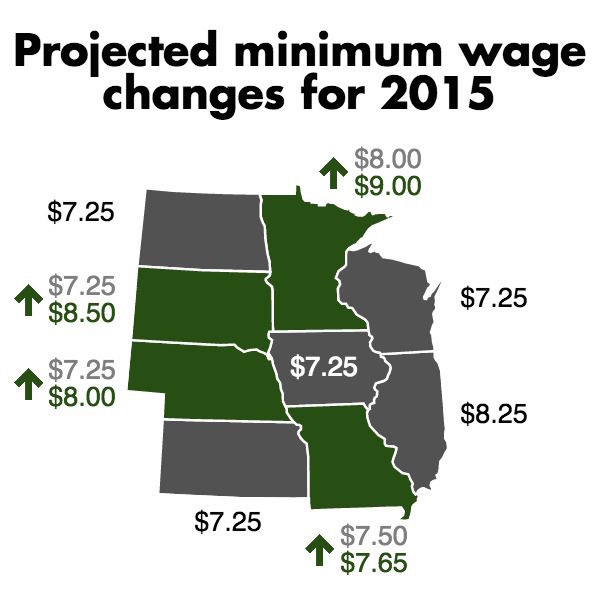Minimum wage bill hinges on bipartisan support

Richard Martinez/Iowa State Daily
Out of the all the states in the Midwest projected to see an increase in the federal minimum wage, Iowa is not one of them. The states who are projected to see an increase, however, will see changes take effect in January 2015.
February 16, 2015
Iowa employees who receive minimum wage could see their hourly pay rate jump from $7.25 to $8.75 an hour by July 1, 2016 if a bill introduced in the Iowa House can find bipartisan support and pass through the legislature.
Support will likely be hard to find due to disagreements about how a minimum wage increase would affect employment.
“One of the claims frequently made is that it’ll cost jobs,” said Sen. Herman Quirmbach, D-Ames, associate professor of economics at Iowa State.
Sen. Charles Grassley, R-Iowa, said this almost verbatim in a statement he made about raising the federal minimum wage.
“It also could or would lead to the elimination altogether of some jobs for low-wage workers,” Grassley said.
A study done in 1992 by David Card and Alan Krueger at Princeton University’s Department of Economics found the argument that a minimum wage increase would cost low-wage jobs to be unfounded.
The study, which looked at the differences in employment in the fast food market between New Jersey, which had just seen a minimum wage increase, and Pennsylvania, which had not, found that an increase in minimum wage actually saw a marginal increase in employment. With Pennsylvania and New Jersey only being separated by the Delaware River, the test was as close to a control as can be expected in the real world.
Meanwhile, the buying power of the minimum wage has been in a slump. In 1978 the federal minimum wage was $2.65 per hour. When indexed for inflation, this would total $9.67 per hour today, 18.4 percent higher than the current federal and state of Iowa wage of $7.25 per hour.
The current minimum wage provides about $15,000 per year for a full time worker, which is not enough to support a single person, let alone a family, Quirmbach said.
“I heard from quite a few people who said it was time for a minimum wage increase,” Quirmbach said in reference to the time he was on the campaign trail in 2014.
A poll published by Progress Iowa, a liberal advocacy group, in 2014 echoes this sentiment, finding that 53 percent of Iowans polled supported an even larger than currently proposed minimum wage increase to $10.10 per hour.
Not only would the minimum wage increase help full-time low-income workers, but it would also help part-time employees such as students, Quirmbach said.
He also said the minimum wage increase would help those students who work part time during the school year or during the summer to try and help pay for the high cost of higher education.
There are some drawbacks to an increase in minimum wage, most of which fall on employers.
“Businesses would experience somewhat greater costs,” Quirmbach said, adding that these costs can be mediated by looking for inefficiencies within the business operation.
However, these costs could eventually be passed on to the consumer, something Quirmbach does not think is as big of a deal as it sounds due to whom it helps.
“If I have to pay an extra quarter for a Big Mac, it’s okay by me if it means helping the person serving me,” Quirmbach said.
Regardless of the pros and cons, the bill would need bipartisan support, which has been somewhat difficult to find in recent years. The bill is required to pass through a Republican controlled House and a Senate controlled by the Democrats to become a law.






